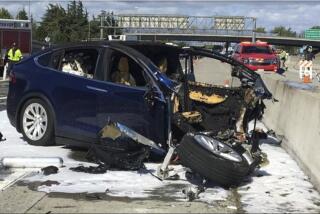Unmanned aircraft pioneer Thomas J. Cassidy Jr. retires
Thomas J. Cassidy Jr., considered the father of the remotely controlled Predator drone that has redefined warfare in Iraq and Afghanistan, retired Monday from the San Diego-area aerospace firm that he helped found and grow.
General Atomics Aeronautical Systems Inc. said Cassidy, 77, retired as president of its Aircraft Systems Group, which builds unmanned aircraft, including the Predator -- currently the most widely deployed unmanned aerial vehicle in the U.S. arsenal.
The company, which disclosed the retirement after an inquiry from a Times reporter, said Cassidy was unavailable for comment.
Cassidy joined General Atomics, the unmanned aircraft’s then-parent, in 1987 after a 34-year career in the U.S. Navy. According to analysts, Cassidy’s standing as a former fighter pilot and rear admiral in the Navy provided credibility to unmanned aircraft, which was seen at the time as a niche technology.
In 1993, Cassidy helped create the aeronautical unit, which later was spun off as an affiliated company. Cassidy is credited for launching the robotic plane business at a time when the technology was ridiculed as unreliable.
The company’s first facility in San Diego was about 1,100 square feet with eight employees. Now, the company occupies a sprawling seven-building campus in Poway that spans 1.4 million square feet with more than 4,000 employees.
While other drone manufacturers rely heavily on suppliers for aircraft parts, General Atomics Aeronautical essentially builds its planes from scratch. To date, the company has built about 400 unmanned aircraft, ranging in price from $3 million to $12 million.
Drones such as the Predator have become ubiquitous in the wars in Iraq and Afghanistan. It can hover over an area for about 24 hours -- controlled from a ground station thousands of miles away -- and look for potential insurgents. It has also been fitted with antitank Hellfire missiles, which it can fire to destroy targets identified as potential threats.
Frank Pace, the executive vice president of Aircraft Systems Group, will take over as president, the company said. Cassidy will stay on as non-executive chairman of the company’s management committee.
william.hennigan
@latimes.com







